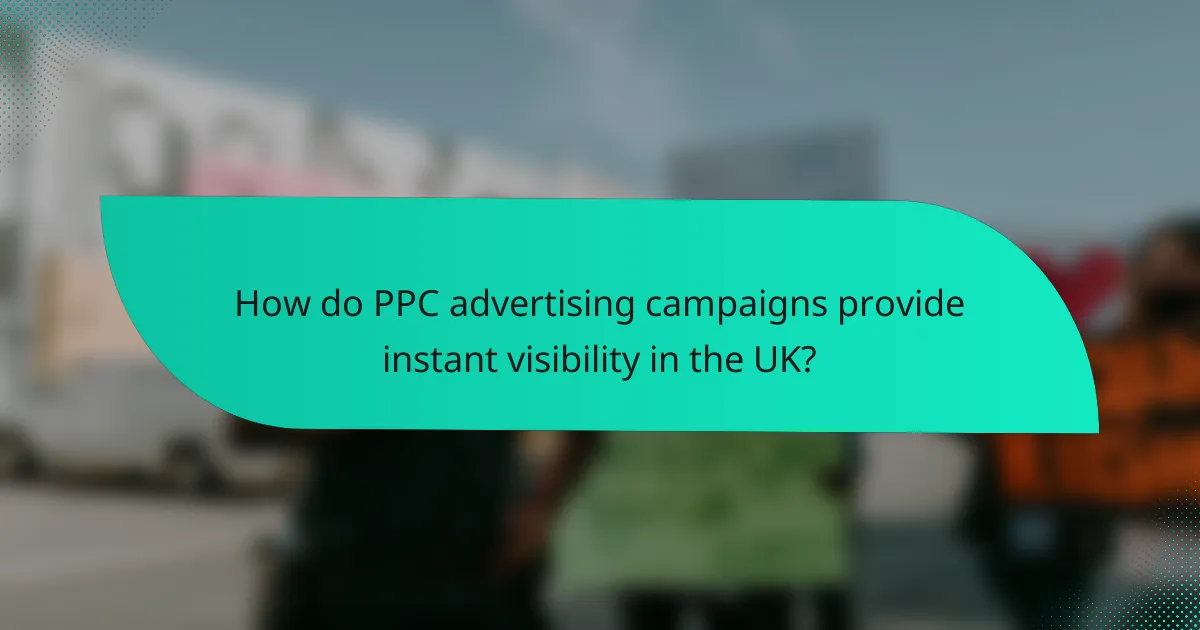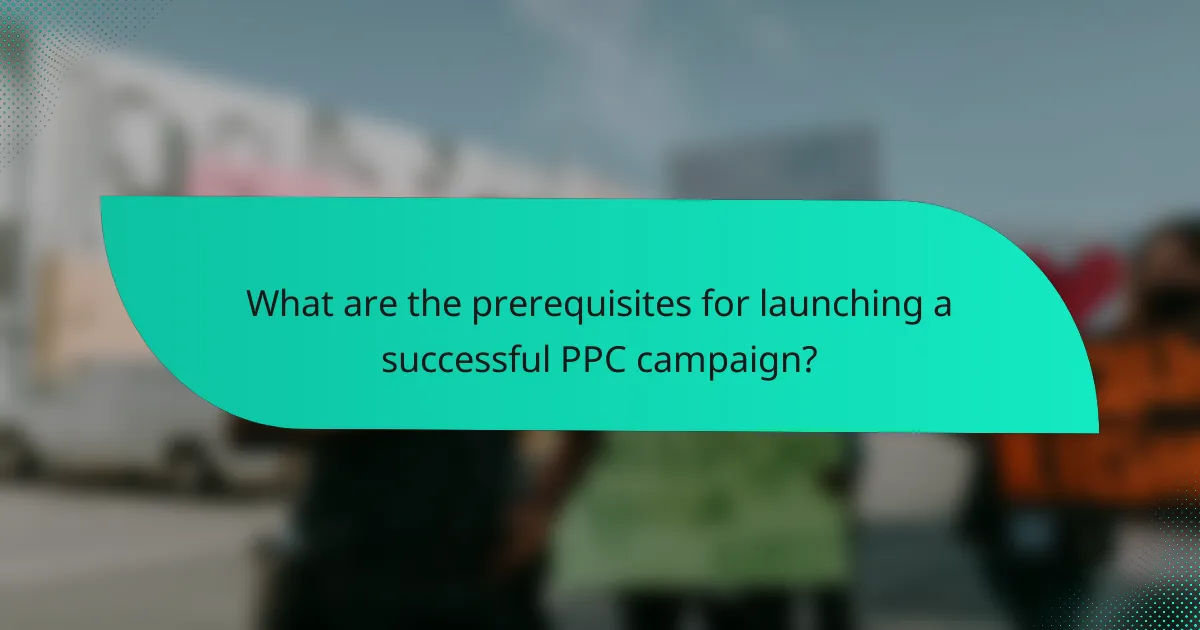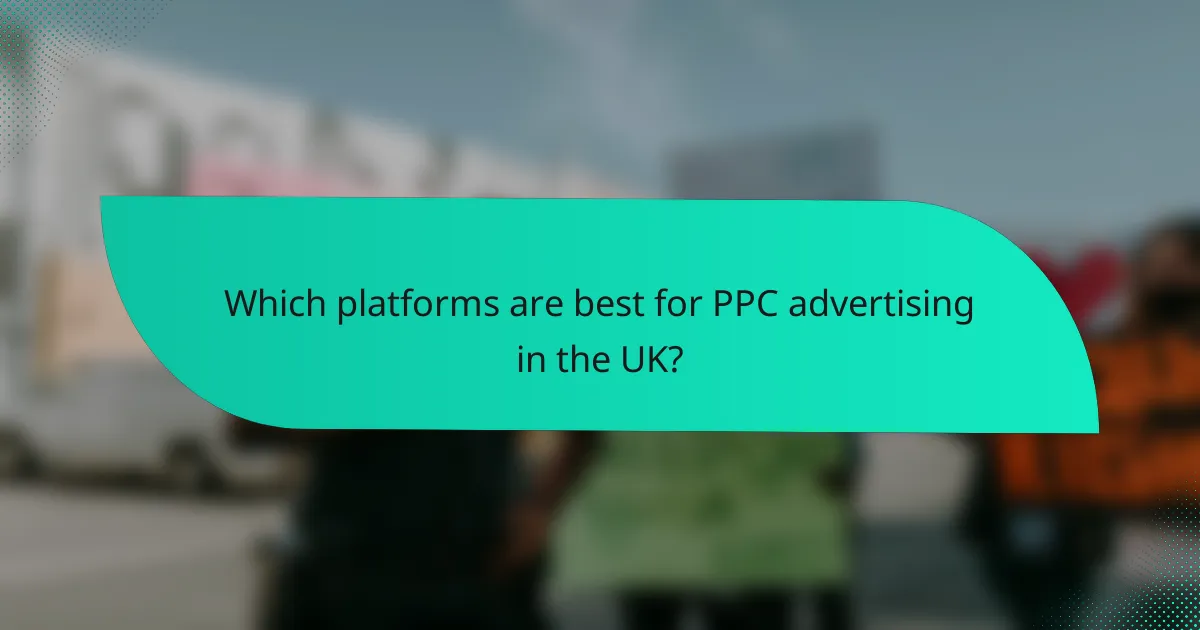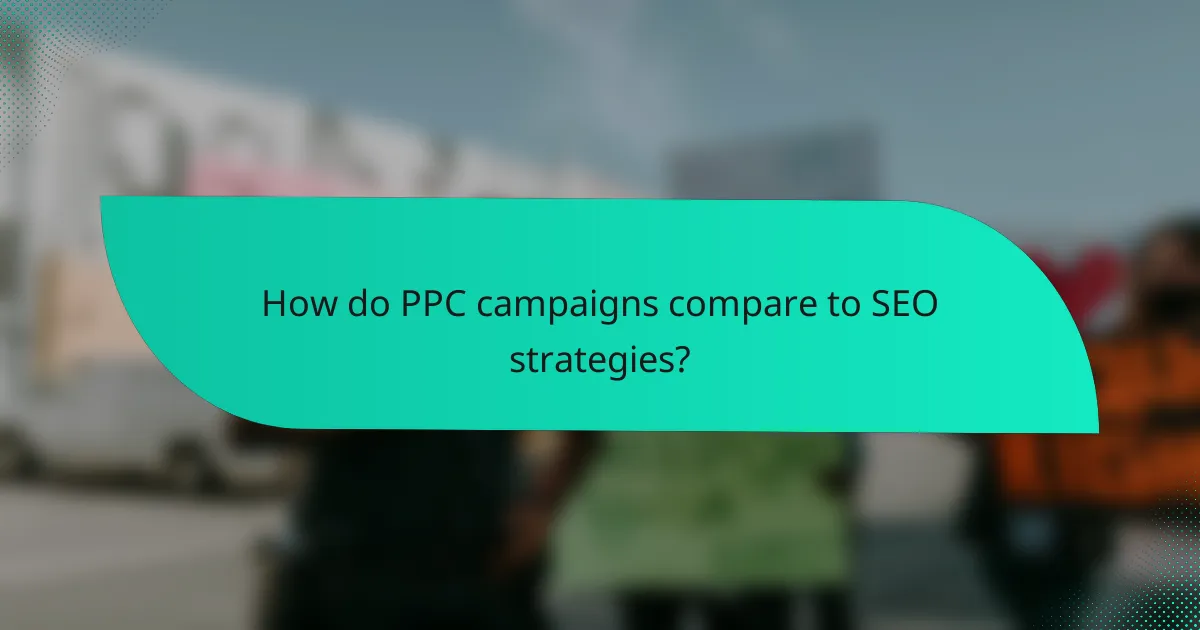PPC advertising campaigns provide businesses with instant visibility by prominently displaying ads on search engines as soon as they are launched. This immediate exposure not only drives traffic but also generates leads effectively. With various budget control options and robust performance tracking, advertisers can manage their spending and optimize campaigns based on data-driven insights.

How do PPC advertising campaigns provide instant visibility in the UK?
PPC advertising campaigns offer instant visibility by placing ads prominently on search engines as soon as they are activated. This immediate exposure allows businesses to reach potential customers quickly, making it an effective strategy for driving traffic and generating leads.
Immediate ad placement on search engines
With PPC campaigns, ads can appear on search engine results pages (SERPs) almost immediately after the campaign is launched. This rapid deployment means that businesses can start attracting visitors to their websites without the lengthy wait associated with organic search optimization.
For example, once a business sets a budget and selects its keywords, ads can be live within a matter of minutes. This is particularly advantageous for time-sensitive promotions or events, allowing businesses to capitalize on current trends or seasonal opportunities.
Targeted audience reach through keywords
PPC campaigns enable advertisers to target specific audiences by selecting relevant keywords that potential customers are likely to use in their searches. This targeted approach ensures that ads are shown to users who are actively looking for related products or services, increasing the chances of conversion.
In the UK, businesses can refine their audience targeting by using local keywords or phrases that resonate with their market. For instance, a local bakery might use keywords like “fresh bread London” to attract nearby customers. This strategic keyword selection not only enhances visibility but also improves the relevance of the ads shown to users.

What budget control options are available for PPC campaigns?
PPC campaigns offer various budget control options that help advertisers manage their spending effectively. These options include setting daily and monthly spending limits, as well as employing specific bid strategies to optimize costs.
Daily and monthly spending limits
Daily and monthly spending limits allow advertisers to cap their PPC expenditures, ensuring they do not exceed their budget. Setting a daily limit means that once the budget is reached, ads will stop showing for the rest of the day, while a monthly limit caps the total spend across the entire month.
When setting these limits, consider your overall marketing budget and the performance of your campaigns. For instance, a daily budget of $50 may be suitable for smaller campaigns, while larger businesses might allocate $500 or more daily, depending on their goals.
Bid strategies for cost management
Bid strategies are essential for managing costs effectively in PPC campaigns. Common strategies include manual bidding, where you set the maximum amount you are willing to pay per click, and automated bidding, which adjusts bids based on performance data to maximize results within your budget.
Choosing the right bid strategy depends on your campaign objectives. For example, if your goal is to increase visibility, you might opt for a strategy that focuses on maximizing clicks. Conversely, if conversions are your priority, consider a cost-per-acquisition (CPA) strategy that targets specific conversion costs.
![]()
How can performance tracking enhance PPC advertising?
Performance tracking significantly enhances PPC advertising by providing insights into campaign effectiveness and areas for improvement. By monitoring key metrics, advertisers can make data-driven decisions to optimize their spending and maximize returns.
Real-time analytics and reporting tools
Real-time analytics and reporting tools allow advertisers to monitor their PPC campaigns as they unfold. These tools provide immediate access to data such as click-through rates, impressions, and costs, enabling quick adjustments to strategies. For instance, if a specific ad is underperforming, adjustments can be made within hours to improve its effectiveness.
Popular platforms like Google Ads and Bing Ads offer built-in analytics features that help visualize performance trends. Utilizing these tools can lead to better budget allocation and enhanced targeting, ultimately improving overall campaign performance.
Conversion tracking for ROI measurement
Conversion tracking is essential for measuring the return on investment (ROI) of PPC campaigns. By tracking actions such as purchases, sign-ups, or inquiries, advertisers can determine which ads and keywords are driving valuable customer interactions. This data is crucial for optimizing campaigns and ensuring that advertising spend is directed towards the most profitable areas.
To set up conversion tracking, advertisers can use tools like Google Analytics or the conversion tracking features available in PPC platforms. Regularly reviewing conversion data helps identify high-performing ads and allows for the refinement of underperforming ones, ensuring better overall ROI.

What are the prerequisites for launching a successful PPC campaign?
To launch a successful PPC campaign, you need a clear understanding of your target audience, well-defined goals, and a solid keyword strategy. These prerequisites ensure that your ads reach the right people and achieve desired outcomes efficiently.
Defining target audience and goals
Identifying your target audience is crucial for effective PPC campaigns. Consider demographics such as age, gender, location, and interests to tailor your ads accordingly. Setting specific goals, like increasing website traffic or boosting sales, helps measure the campaign’s success.
Utilize tools like Google Analytics or social media insights to gather data about your audience. This information can guide your ad messaging and placement, ensuring that your budget is spent effectively.
Keyword research and selection
Keyword research is essential for determining which terms potential customers are using to find products or services like yours. Use tools such as Google Keyword Planner to identify relevant keywords with good search volume and manageable competition.
Select a mix of broad and long-tail keywords to capture a wider audience while also targeting specific queries. Aim for a balance that aligns with your goals, keeping in mind that long-tail keywords often have lower costs and higher conversion rates.

Which platforms are best for PPC advertising in the UK?
The best platforms for PPC advertising in the UK include Google Ads and Facebook Ads, each serving different marketing objectives. Google Ads excels in search visibility, while Facebook Ads focuses on social engagement, making them suitable for various campaign goals.
Google Ads for search visibility
Google Ads is the leading platform for achieving search visibility, allowing businesses to display ads on Google’s search results pages. This platform operates on a pay-per-click model, meaning you only pay when someone clicks on your ad, which can be an efficient way to drive traffic.
When using Google Ads, consider targeting specific keywords relevant to your business. A well-structured campaign can yield a return on investment (ROI) that ranges from moderate to high, depending on your industry and competition. Regularly reviewing and optimizing your keyword strategy is crucial for maintaining visibility.
Facebook Ads for social engagement
Facebook Ads is ideal for fostering social engagement and building brand awareness. This platform allows you to target users based on demographics, interests, and behaviors, making it effective for reaching specific audiences.
To maximize engagement on Facebook, create visually appealing ads that resonate with your target market. Consider using a mix of ad formats, such as image, video, and carousel ads, to capture attention. Monitor your ad performance and adjust your budget accordingly to ensure optimal results.

How do PPC campaigns compare to SEO strategies?
PPC campaigns provide immediate visibility in search results, while SEO strategies focus on long-term organic growth. Both approaches have unique advantages and can complement each other in a comprehensive digital marketing strategy.
Immediate results vs. long-term growth
PPC campaigns deliver instant results by placing ads at the top of search engine results pages, allowing businesses to attract traffic immediately after launching a campaign. In contrast, SEO requires time to build authority and improve rankings, often taking several months to see significant results.
For businesses looking to generate quick leads or sales, PPC is the more effective choice. However, for sustainable growth and brand recognition, investing in SEO can yield lasting benefits over time.
Cost differences between PPC and SEO
PPC advertising typically involves paying for each click, which can vary widely based on competition and keywords, often ranging from a few cents to several dollars per click. This means that costs can accumulate quickly, especially in competitive markets.
On the other hand, SEO primarily requires investment in content creation and optimization, which can be more cost-effective in the long run. While initial costs for SEO might be higher due to content development, the ongoing costs are generally lower compared to continuous PPC spending. Businesses should evaluate their budget and goals to determine the best approach for their needs.

What are common pitfalls in PPC advertising?
PPC advertising can be highly effective, but several common pitfalls can undermine its success. Advertisers often face challenges such as poor keyword selection, inadequate budget management, and lack of performance tracking, which can lead to wasted resources and missed opportunities.
Poor keyword selection
Choosing the wrong keywords can significantly impact the effectiveness of a PPC campaign. Advertisers should focus on relevant, high-intent keywords that align with their target audience’s search behavior. Using tools like Google Keyword Planner can help identify effective keywords and avoid overly broad or irrelevant terms.
Additionally, regularly reviewing and refining keyword lists is essential. Negative keywords should also be utilized to filter out unwanted traffic, ensuring that the ads reach the most relevant users.
Inadequate budget management
Effective budget management is crucial in PPC advertising to maximize return on investment. Advertisers should set clear budgets based on campaign goals and expected performance. It’s advisable to allocate budgets dynamically, adjusting based on which campaigns or keywords are performing best.
Monitoring daily spending and adjusting bids can help prevent overspending. Setting daily or monthly caps can also protect against unexpected spikes in costs, ensuring that the budget is used efficiently.
Lack of performance tracking
Without proper performance tracking, it’s challenging to gauge the success of a PPC campaign. Advertisers should implement tracking mechanisms, such as conversion tracking and analytics tools, to measure key performance indicators (KPIs) like click-through rates, conversion rates, and cost per acquisition.
Regularly analyzing performance data allows for informed adjustments to campaigns. Setting up A/B testing for ad copy and landing pages can also provide insights into what resonates best with the audience, leading to improved results over time.